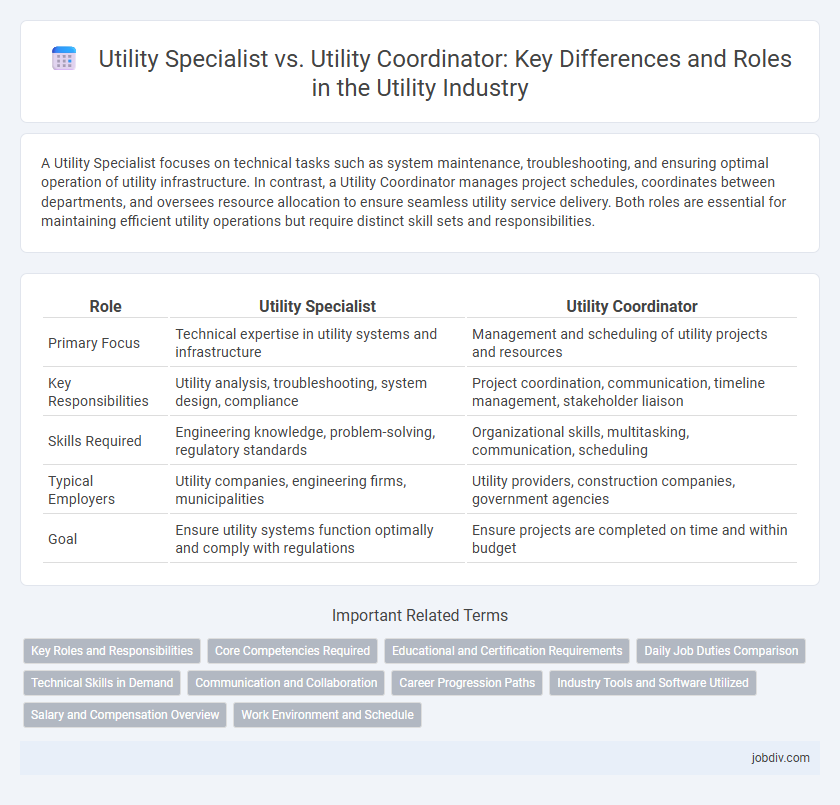A Utility Specialist focuses on technical tasks such as system maintenance, troubleshooting, and ensuring optimal operation of utility infrastructure. In contrast, a Utility Coordinator manages project schedules, coordinates between departments, and oversees resource allocation to ensure seamless utility service delivery. Both roles are essential for maintaining efficient utility operations but require distinct skill sets and responsibilities.
Table of Comparison
| Role | Utility Specialist | Utility Coordinator |
|---|---|---|
| Primary Focus | Technical expertise in utility systems and infrastructure | Management and scheduling of utility projects and resources |
| Key Responsibilities | Utility analysis, troubleshooting, system design, compliance | Project coordination, communication, timeline management, stakeholder liaison |
| Skills Required | Engineering knowledge, problem-solving, regulatory standards | Organizational skills, multitasking, communication, scheduling |
| Typical Employers | Utility companies, engineering firms, municipalities | Utility providers, construction companies, government agencies |
| Goal | Ensure utility systems function optimally and comply with regulations | Ensure projects are completed on time and within budget |
Key Roles and Responsibilities
Utility Specialists manage complex utility systems by analyzing infrastructure, overseeing maintenance, and ensuring regulatory compliance to optimize service delivery. Utility Coordinators facilitate communication between departments, schedule repairs, and track utility projects to ensure timely execution and resource allocation. Both roles collaborate closely to maintain operational efficiency, with Specialists focusing on technical expertise and Coordinators emphasizing logistical support.
Core Competencies Required
Utility Specialists require advanced technical knowledge in system operations, regulatory compliance, and resource management, enabling them to optimize utility performance and troubleshoot complex issues. Utility Coordinators focus on project scheduling, vendor communication, and data tracking to ensure timely execution and coordination of utility services. Both roles demand strong analytical abilities, attention to detail, and proficiency in industry-specific software for efficient utility management.
Educational and Certification Requirements
Utility Specialists typically require a bachelor's degree in engineering, environmental science, or a related technical field, along with certifications such as Certified Utility Professional (CUP) or Project Management Professional (PMP). Utility Coordinators often hold an associate degree or relevant certification such as OSHA Safety Certificate, emphasizing practical training in utility operations and safety compliance. Both roles benefit from specialized courses in utility management software and regulatory standards to enhance operational efficiency and regulatory adherence.
Daily Job Duties Comparison
A Utility Specialist primarily manages technical assessments, system maintenance, and regulatory compliance for utility infrastructure, ensuring optimal performance and safety. A Utility Coordinator focuses on scheduling, communication, and coordination between teams and contractors to facilitate project workflows and operational efficiency. Both roles require strong problem-solving skills but differ in their emphasis on technical expertise versus logistical management.
Technical Skills in Demand
Utility specialists demand expertise in advanced systems analysis, infrastructure maintenance, and regulatory compliance to optimize operational efficiency. Utility coordinators require strong project management skills, proficiency in scheduling software, and effective communication abilities to ensure seamless coordination among technical teams and stakeholders. Both roles prioritize knowledge of smart grid technologies, GIS mapping, and data analytics for enhanced decision-making in utility operations.
Communication and Collaboration
Utility Specialists excel in technical communication, ensuring accurate data exchange between departments and resolving complex utility issues with precision. Utility Coordinators prioritize collaborative communication, facilitating team workflows, and managing stakeholder interactions to maintain efficient project timelines. Effective communication and collaboration are essential in both roles to optimize utility operations and enhance interdepartmental coordination.
Career Progression Paths
Utility Specialists typically possess in-depth technical expertise and focus on analyzing and optimizing utility systems, serving as valuable assets in operational efficiency improvements. Utility Coordinators manage daily utility operations and communication between teams, often gaining broad organizational knowledge and leadership skills that pave the way for advancement into supervisory or managerial roles. Career progression from Utility Coordinator to Specialist or higher management positions depends on gaining technical certifications, project experience, and cross-functional collaboration within utility services.
Industry Tools and Software Utilized
Utility Specialists leverage advanced industry tools such as Geographic Information Systems (GIS), asset management software like Maximo, and energy management platforms to analyze and optimize utility infrastructure. Utility Coordinators primarily utilize project management software including Microsoft Project and scheduling tools like Primavera to coordinate field operations and ensure timely service delivery. Both roles depend heavily on SCADA systems for real-time monitoring and control of utility networks, but Specialists focus more on data analysis while Coordinators emphasize operational execution.
Salary and Compensation Overview
Utility Specialists typically earn higher salaries than Utility Coordinators, reflecting their advanced expertise and strategic responsibilities in managing utility systems. According to industry salary reports, Utility Specialists average an annual salary range of $65,000 to $85,000, while Utility Coordinators usually fall between $45,000 and $60,000. Compensation packages for Specialists often include performance bonuses and technical certifications incentives, whereas Coordinators may receive standard benefits and limited bonuses.
Work Environment and Schedule
Utility Specialists typically work in dynamic environments such as power plants or water treatment facilities, often requiring on-site presence with variable shifts that include nights or weekends. Utility Coordinators generally operate in office settings, managing utility schedules and communications during standard business hours, which offers more predictable routines. Both roles demand adaptability, but Specialists face more physically demanding and irregular work patterns compared to Coordinators.
Utility Specialist vs Utility Coordinator Infographic

 jobdiv.com
jobdiv.com